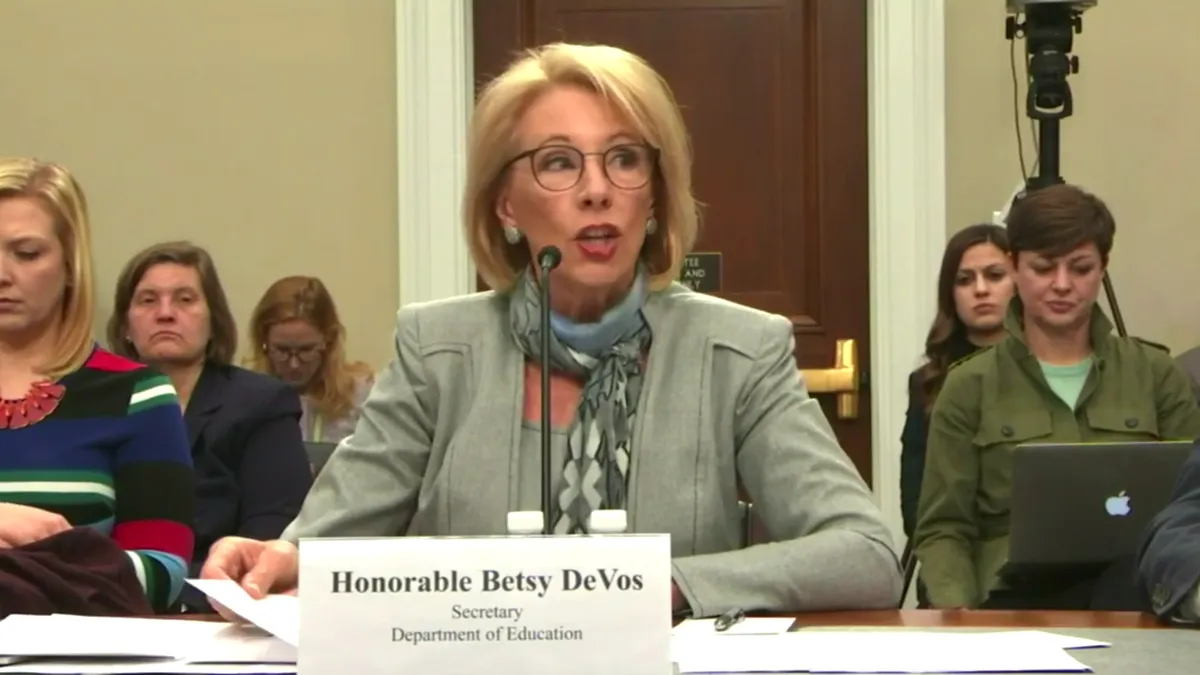Dive Brief:
-
A federal judge last week took issue with a provision of a Trump-era regulation that governs how colleges must investigate and potentially punish sexual misconduct on campuses.
-
The rule dictated that when colleges judged a report of sexual violence, they could not consider statements made by parties or witnesses who did not subject themselves to cross-examination in a hearing. U.S. District Court Judge William Young said this prohibition was unlawful. The court sent it back to the U.S. Department of Education for further explanation and consideration.
-
Young preserved the rest of the rule on Title IX, the federal law banning sex-based discrimination in educational settings.
Dive Insight:
The Title IX regulation issued by former Education Secretary Betsy DeVos took effect about a year ago. It aimed to correct what the Trump administration and due process activists considered an unbalanced approach to handling sexual misconduct cases.
The federal government's previous policies on Title IX, which came in the form of guidance from the Obama administration, were too slanted against students accused of sexual misconduct, according to critics. They said the guidance, despite not carrying the force of law, pressured colleges to find students responsible for sexual violence under the threat of having their federal funding pulled.
Advocates for sexual assault survivors, meanwhile, credit the Obama administration's guidance with bringing new attention to campus sexual violence and have railed against the DeVos rule for undoing that progress.
The Trump administration's rule creates a judiciary-style system for evaluating reports of sexual assault. It requires colleges to hold special hearings and allow those accused of sexual assault and their accusers to cross-examine each other through an adviser of their choice.
A provision of the Trump rule said that investigators couldn't consider statements made outside of cross-examination when deciding a case.
Theoretically, this restriction would force colleges to ignore accused students admitting responsibility for sexual misconduct if they decided not to testify at a hearing.
Young ruled in a lawsuit filed by several survivor advocacy organizations, a current college student, a former college student and a K-12 student. The judge found the cross-examination part of the rule was "arbitrary and capricious." The department failed to recognize the consequences of such a restriction when constructing the regulation, Young said.
And any attorney would advise their client not to attend a hearing if it meant the client wouldn't have to make incriminating statements against themselves, Young wrote in court filings.
Whether the judge's decision will markedly change the Education Department's Title IX enforcement is unknown, said Joshua Richards, an attorney and vice chair of the higher education practice for the law firm Saul Ewing Arnstein & Lehr LLP.
Young could have blocked the department from administering the provision in question. He did not, Richards said. Instead, the judge called for the agency to explain the decision to include it in the regulation.
Richards said this means the department would have to opt not to penalize colleges for ignoring that part of the rule. And President Joe Biden's administration might not be inclined to make major changes while developing its own Title IX regulation for fear of inviting legal challenges, Richards said.
"The department will want to avoid litigation around enforcement of the DeVos rule while it's preparing its own rule," he said. So it's possible colleges will not get clarity on this issue at all.
The Education Department is reviewing the decision, a spokesperson said in an emailed statement. Under an executive order from Biden, the department has taken steps to examine the Trump-era Title IX regulations. Those steps include holding a virtual hearing in June and issuing a Q&A to provide schools clarity about their obligations under the new regulation, the spokesperson said.














